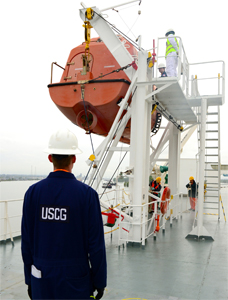For 10 years leading up to 2017, 60 seafarer fatalities and 145 serious injuries occurred globally during lifeboat testing, according to a study by the ship management firm InterManager.
International Maritime Organization (IMO) guidelines for life-saving appliances that took effect Jan. 1 raise awareness about lifeboat accidents and aim to “engineer out” the possibility of mistakes during drills, according to Sean Kline, director of maritime affairs for the Chamber of Shipping of America (CSA).
The IMO Maritime Safety Committee (MSC) adopted amendments to Safety of Life at Sea (SOLAS) regulations III/3 and III/20 in 2016. The amendments, contained in Resolution MSC.402(96), introduce new protocols for the maintenance and inspection of life-saving appliances and release gear, including rescue boats, fast-rescue boats, launching appliances and davit-launched life rafts. The guidelines are now being enforced by IMO member states.
The provisions represent “the culmination of some 10 years’ work on the issue. The intention is to ensure that seafarers can be confident that they can fully rely on the IMO-mandated life-saving appliances and equipment at their disposal,” Natasha Brown, media and communications officer at the IMO, told Professional Mariner.
Equipment carriage requirements will not change for operators. Lt. Amy Midgett, spokeswoman for the U.S. Coast Guard, said that with equipment manufacturers, service providers, operators and class societies already following non-mandatory IMO circulars MSC.1/1206 and MSC.1/1277, she anticipates no significant change to the status quo. The circulars provide guidelines for periodic equipment servicing and recommendations on service provider authorization.
MSC.402(96) contains further guidance related to service providers, requiring personnel to receive certifications for each make and type of equipment. Under the guidelines, training will include classroom instruction, field experience and a competence assessment.
Midgett told Professional Mariner in November that the Coast Guard is developing policy containing additional guidance on personnel certification, but she did not say when it would be finalized. According to a Navigation and Vessel Inspection Circular (NVIC) issued by the Coast Guard on Nov. 20, vessel operators must use certified personnel from an equipment manufacturer or authorized third-party service provider for annual and five-year examinations of safety equipment.
In addition to the service provider requirement, the IMO amendments contain instructions for five-year testing for operational overloads, including the adjustment of release gear and examination of vital parts in the release system. MSC.402(96) also contains step-by-step instructions for annual operational testing of life-saving gear, and it identifies specific lifeboat items that should be examined — boat structure, engine and propulsion systems, and sprinkler systems among them.
Kline said the extra detail would reduce the potential for injury, noting the high number of casualties worldwide resulting from free-fall accidents during drills.
He summarized the CSA’s message to operators regarding the new guidelines: “Look at your service providers … talk to your flag states and make sure that your service provider is still one of the ones that is allowed to be used.”
While weekly and monthly inspections may still be carried out by crewmembers under SOLAS, duties will change slightly. In addition to a third mate, a senior ship’s officer must certify inspections of life-saving equipment under the amendments.
“There’s going to be a second set of eyes on there, whether that’s the captain or the chief mate,” Kline added.
To ensure compliance, operators must document the servicing of life-saving appliances, Midgett said. Operators should make these records available during yearly inspections, according to the Nov. 20 Coast Guard circular.
“The takeaway is that we’re going to have safer lifeboats for the seafarers, and that’s always what we have to keep in mind,” Kline said.

